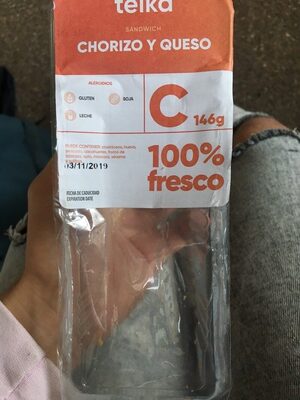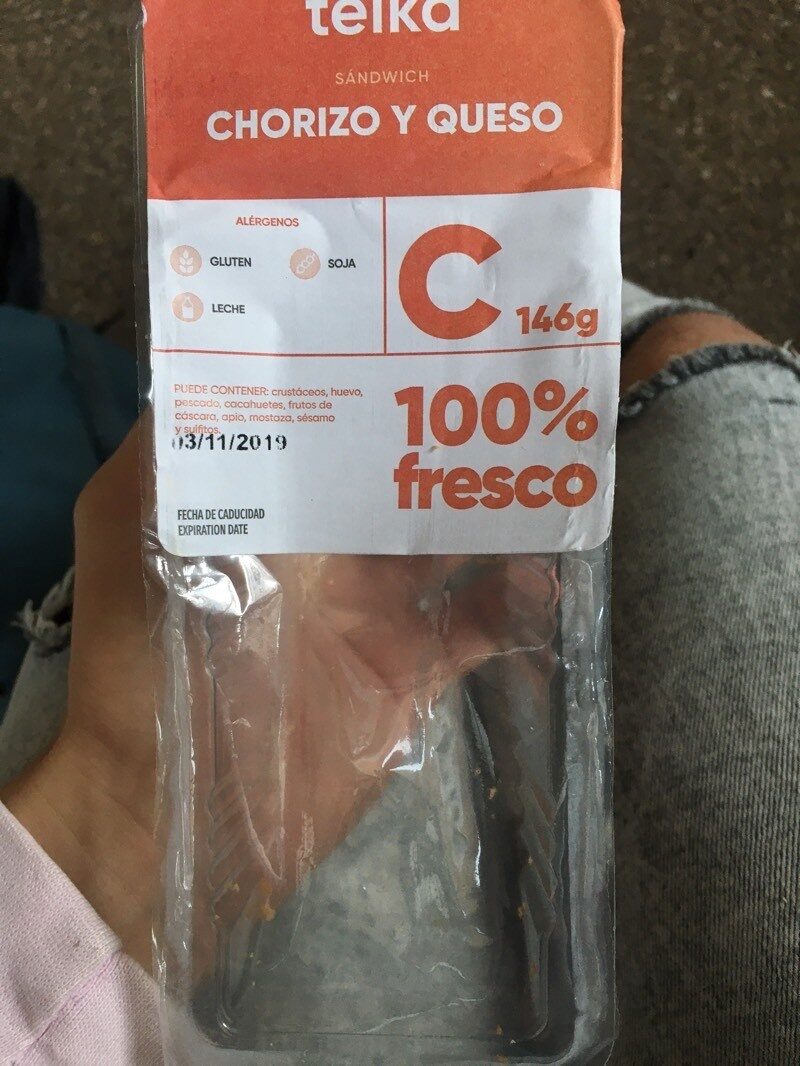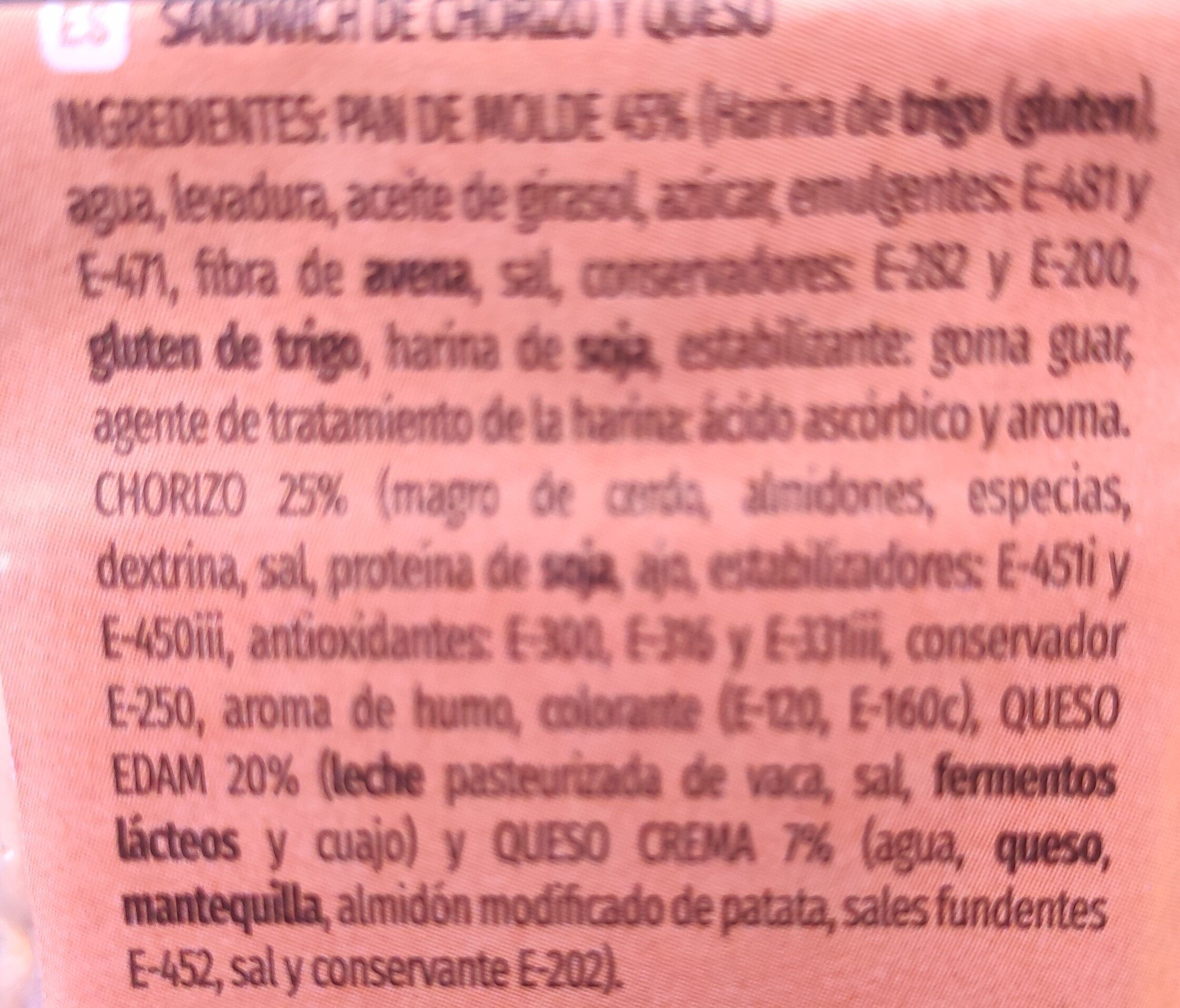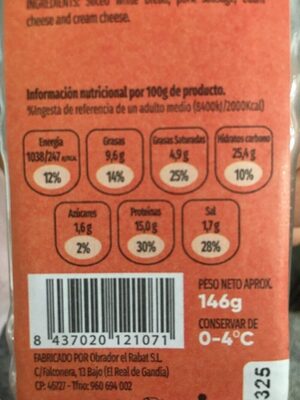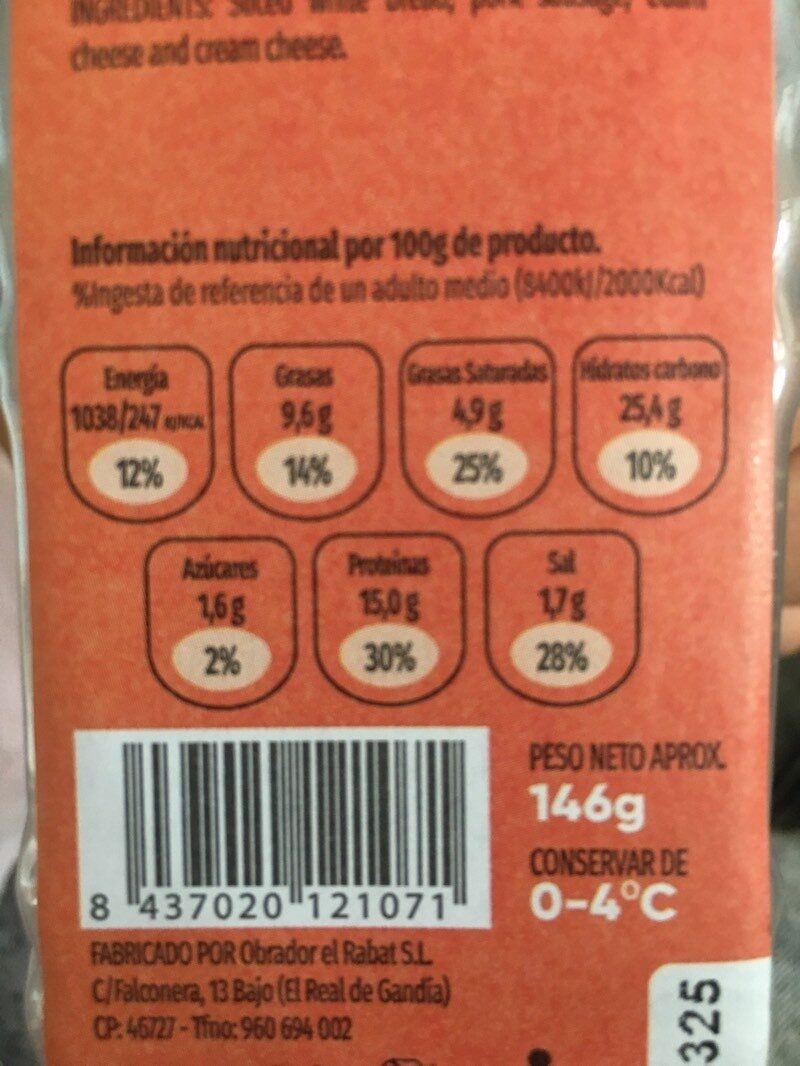Help us make food transparency the norm!
As a non-profit organization, we depend on your donations to continue informing consumers around the world about what they eat.
The food revolution starts with you!
Sandwich chorizo y queso - Teika - 146g
Sandwich chorizo y queso - Teika - 146g
This product page is not complete. You can help to complete it by editing it and adding more data from the photos we have, or by taking more photos using the app for Android or iPhone/iPad. Thank you!
×
Barcode: 8437020121071 (EAN / EAN-13)
Quantity: 146g
Brands: Teika
Categories: Sandwiches
Countries where sold: Spain
Matching with your preferences
Health
Ingredients
-
55 ingredients
: PAN DE MOLDE 45% (Harina de trigo (gluten), agua, levadura, aceite de girasol, azúcar, emulgentes: E-481 y E-471, fibra de avena, sal, conservadores: E-282 y E-200, gluten de trigo, harina de soja, estabilizante: goma guar, agente de tratamiento de la harina: ácido ascórbico y aroma. CHORIZO 25% (magro de cerdo, almidones, especias, dextrina, sal, proteína de soja, ajo, estabilizadores: E-451i y E-450iii, antioxidantes: E-300, E-316 y E-331iii, conservador E-250, aroma de humo, colorante (E-120, E-160c), QUESO EDAM 20% (leche pasteurizada de vaca, sal, fermentos lácteos y cuajo) y QUESO CREMA 7% (agua, queso, mantequilla, almidón modificado de patata, sales fundentes E-452, sal y conservante E-202).Allergens: Gluten, Milk
Food processing
-
Ultra processed foods
Elements that indicate the product is in the 4 - Ultra processed food and drink products group:
- Additive: E120 - Cochineal
- Additive: E1400 - Dextrin
- Additive: E14XX - Modified Starch
- Additive: E160c - Paprika extract
- Additive: E412 - Guar gum
- Additive: E450 - Diphosphates
- Additive: E451 - Triphosphates
- Additive: E452 - Polyphosphates
- Additive: E471 - Mono- and diglycerides of fatty acids
- Additive: E481 - Sodium stearoyl-2-lactylate
- Ingredient: Colour
- Ingredient: Emulsifier
- Ingredient: Flavouring
- Ingredient: Gluten
Food products are classified into 4 groups according to their degree of processing:
- Unprocessed or minimally processed foods
- Processed culinary ingredients
- Processed foods
- Ultra processed foods
The determination of the group is based on the category of the product and on the ingredients it contains.
Additives
-
E120 - Cochineal
Carminic acid: Carminic acid -C22H20O13- is a red glucosidal hydroxyanthrapurin that occurs naturally in some scale insects, such as the cochineal, Armenian cochineal, and Polish cochineal. The insects produce the acid as a deterrent to predators. An aluminum salt of carminic acid is the coloring agent in carmine. Synonyms are C.I. 75470 and C.I. Natural Red 4. The chemical structure of carminic acid consists of a core anthraquinone structure linked to a glucose sugar unit. Carminic acid was first synthesized in the laboratory by organic chemists in 1991.Source: Wikipedia
-
E1400 - Dextrin
Dextrin: Dextrins are a group of low-molecular-weight carbohydrates produced by the hydrolysis of starch or glycogen. Dextrins are mixtures of polymers of D-glucose units linked by α--1→4- or α--1→6- glycosidic bonds. Dextrins can be produced from starch using enzymes like amylases, as during digestion in the human body and during malting and mashing, or by applying dry heat under acidic conditions -pyrolysis or roasting-. The latter process is used industrially, and also occurs on the surface of bread during the baking process, contributing to flavor, color and crispness. Dextrins produced by heat are also known as pyrodextrins. The starch hydrolyses during roasting under acidic conditions, and short-chained starch parts partially rebranch with α--1‚6- bonds to the degraded starch molecule. See also Maillard Reaction. Dextrins are white, yellow, or brown powders that are partially or fully water-soluble, yielding optically active solutions of low viscosity. Most of them can be detected with iodine solution, giving a red coloration; one distinguishes erythrodextrin -dextrin that colours red- and achrodextrin -giving no colour-. White and yellow dextrins from starch roasted with little or no acid are called British gum.Source: Wikipedia
-
E200 - Sorbic acid
Sorbic acid: Sorbic acid, or 2‚4-hexadienoic acid, is a natural organic compound used as a food preservative. It has the chemical formula CH3-CH-4CO2H. It is a colourless solid that is slightly soluble in water and sublimes readily. It was first isolated from the unripe berries of the Sorbus aucuparia -rowan tree-, hence its name.Source: Wikipedia
-
E250 - Sodium nitrite
Sodium nitrite: Sodium nitrite is the inorganic compound with the chemical formula NaNO2. It is a white to slightly yellowish crystalline powder that is very soluble in water and is hygroscopic. It is a useful precursor to a variety of organic compounds, such as pharmaceuticals, dyes, and pesticides, but it is probably best known as a food additive to prevent botulism. It is on the World Health Organization's List of Essential Medicines, the most important medications needed in a basic health system.Nitrate or nitrite -ingested- under conditions that result in endogenous nitrosation has been classified as "probably carcinogenic to humans" by International Agency for Research on Cancer -IARC-.Source: Wikipedia
-
E282 - Calcium propionate
Calcium propanoate: Calcium propanoate or calcium propionate has the formula Ca-C2H5COO-2. It is the calcium salt of propanoic acid.Source: Wikipedia
-
E316 - Sodium erythorbate
Sodium erythorbate: Sodium erythorbate -C6H7NaO6- is a food additive used predominantly in meats, poultry, and soft drinks. Chemically, it is the sodium salt of erythorbic acid. When used in processed meat such as hot dogs and beef sticks, it increases the rate at which nitrite reduces to nitric oxide, thus facilitating a faster cure and retaining the pink coloring. As an antioxidant structurally related to vitamin C, it helps improve flavor stability and prevents the formation of carcinogenic nitrosamines. When used as a food additive, its E number is E316. The use of erythorbic acid and sodium erythorbate as a food preservative has increased greatly since the U.S. Food and Drug Administration banned the use of sulfites as preservatives in foods intended to be eaten fresh -such as ingredients for fresh salads- and as food processors have responded to the fact that some people are allergic to sulfites. It can also be found in bologna, and is occasionally used in beverages, baked goods, and potato salad.Sodium erythorbate is produced from sugars derived from different sources, such as beets, sugar cane, and corn. An urban myth claims that sodium erythorbate is made from ground earthworms; however, there is no truth to the myth. It is thought that the genesis of the legend comes from the similarity of the chemical name to the words earthworm and bait.Alternative applications include the development of additives that could be utilized as anti-oxidants in general. For instance, this substance has been implemented in the development of corrosion inhibitors for metals and it has been implemented in active packaging.Sodium erythorbate is soluble in water. The pH of the aqueous solution of the sodium salt is between 5 and 6. A 10% solution, made from commercial grade sodium erythorbate, may have a pH of 7.2 to 7.9. In its dry, crystalline state it is nonreactive. But, when in solution with water it readily reacts with atmospheric oxygen and other oxidizing agents, which makes it a valuable antioxidant.Source: Wikipedia
-
E331 - Sodium citrates
Sodium citrate: Sodium citrate may refer to any of the sodium salts of citrate -though most commonly the third-: Monosodium citrate Disodium citrate Trisodium citrateThe three forms of the salt are collectively known by the E number E331. Sodium citrates are used as acidity regulators in food and drinks, and also as emulsifiers for oils. They enable cheeses to melt without becoming greasy.Source: Wikipedia
-
E331iii - Trisodium citrate
Sodium citrate: Sodium citrate may refer to any of the sodium salts of citrate -though most commonly the third-: Monosodium citrate Disodium citrate Trisodium citrateThe three forms of the salt are collectively known by the E number E331. Sodium citrates are used as acidity regulators in food and drinks, and also as emulsifiers for oils. They enable cheeses to melt without becoming greasy.Source: Wikipedia
-
E412 - Guar gum
Guar gum (E412) is a natural food additive derived from guar beans.
This white, odorless powder is valued for its remarkable thickening and stabilizing properties, making it a common ingredient in various food products, including sauces, dressings, and ice creams.
When used in moderation, guar gum is considered safe for consumption, with no known adverse health effects.
-
E450 - Diphosphates
Diphosphates (E450) are food additives often utilized to modify the texture of products, acting as leavening agents in baking and preventing the coagulation of canned food.
These salts can stabilize whipped cream and are also found in powdered products to maintain their flow properties. They are commonly present in baked goods, processed meats, and soft drinks.
Derived from phosphoric acid, they're part of our daily phosphate intake, which often surpasses recommended levels due to the prevalence of phosphates in processed foods and drinks.
Excessive phosphate consumption is linked to health issues, such as impaired kidney function and weakened bone health. Though diphosphates are generally regarded as safe when consumed within established acceptable daily intakes, it's imperative to monitor overall phosphate consumption to maintain optimal health.
-
E451 - Triphosphates
Sodium triphosphate: Sodium triphosphate -STP-, also sodium tripolyphosphate -STPP-, or tripolyphosphate -TPP-,- is an inorganic compound with formula Na5P3O10. It is the sodium salt of the polyphosphate penta-anion, which is the conjugate base of triphosphoric acid. It is produced on a large scale as a component of many domestic and industrial products, especially detergents. Environmental problems associated with eutrophication are attributed to its widespread use.Source: Wikipedia
-
E451i - Pentasodium triphosphate
Sodium triphosphate: Sodium triphosphate -STP-, also sodium tripolyphosphate -STPP-, or tripolyphosphate -TPP-,- is an inorganic compound with formula Na5P3O10. It is the sodium salt of the polyphosphate penta-anion, which is the conjugate base of triphosphoric acid. It is produced on a large scale as a component of many domestic and industrial products, especially detergents. Environmental problems associated with eutrophication are attributed to its widespread use.Source: Wikipedia
-
E471 - Mono- and diglycerides of fatty acids
Mono- and diglycerides of fatty acids (E471), are food additives commonly used as emulsifiers in various processed foods.
These compounds consist of glycerol molecules linked to one or two fatty acid chains, which help stabilize and blend water and oil-based ingredients. E471 enhances the texture and shelf life of products like margarine, baked goods, and ice cream, ensuring a smooth and consistent texture.
It is generally considered safe for consumption within established regulatory limits.
-
E481 - Sodium stearoyl-2-lactylate
Sodium stearoyl lactylate: Sodium stearoyl-2-lactylate -sodium stearoyl lactylate or SSL- is a versatile, FDA approved food additive used to improve the mix tolerance and volume of processed foods. It is one type of a commercially available lactylate. SSL is non-toxic, biodegradable, and typically manufactured using biorenewable feedstocks. Because SSL is a safe and highly effective food additive, it is used in a wide variety of products ranging from baked goods and desserts to pet foods.As described by the Food Chemicals Codex 7th edition, SSL is a cream-colored powder or brittle solid. SSL is currently manufactured by the esterification of stearic acid with lactic acid and partially neutralized with either food-grade soda ash -sodium carbonate- or caustic soda -concentrated sodium hydroxide-. Commercial grade SSL is a mixture of sodium salts of stearoyl lactylic acids and minor proportions of other sodium salts of related acids. The HLB for SSL is 10-12. SSL is slightly hygroscopic, soluble in ethanol and in hot oil or fat, and dispersible in warm water. These properties are the reason that SSL is an excellent emulsifier for fat-in-water emulsions and can also function as a humectant.Source: Wikipedia
Ingredients analysis
-
May contain palm oil
Ingredients that may contain palm oil: E481, E471
-
Non-vegan
Non-vegan ingredients: Chorizo, Lean pork, E120, Edam, Pasteurised cow's milk, Cheese, ButterSome ingredients could not be recognized.
We need your help!
You can help us recognize more ingredients and better analyze the list of ingredients for this product and others:
- Edit this product page to correct spelling mistakes in the ingredients list, and/or to remove ingredients in other languages and sentences that are not related to the ingredients.
- Add new entries, synonyms or translations to our multilingual lists of ingredients, ingredient processing methods, and labels.
If you would like to help, join the #ingredients channel on our Slack discussion space and/or learn about ingredients analysis on our wiki. Thank you!
-
Non-vegetarian
Non-vegetarian ingredients: Chorizo, Lean pork, E120Some ingredients could not be recognized.
We need your help!
You can help us recognize more ingredients and better analyze the list of ingredients for this product and others:
- Edit this product page to correct spelling mistakes in the ingredients list, and/or to remove ingredients in other languages and sentences that are not related to the ingredients.
- Add new entries, synonyms or translations to our multilingual lists of ingredients, ingredient processing methods, and labels.
If you would like to help, join the #ingredients channel on our Slack discussion space and/or learn about ingredients analysis on our wiki. Thank you!
-
Details of the analysis of the ingredients
We need your help!
Some ingredients could not be recognized.
We need your help!
You can help us recognize more ingredients and better analyze the list of ingredients for this product and others:
- Edit this product page to correct spelling mistakes in the ingredients list, and/or to remove ingredients in other languages and sentences that are not related to the ingredients.
- Add new entries, synonyms or translations to our multilingual lists of ingredients, ingredient processing methods, and labels.
If you would like to help, join the #ingredients channel on our Slack discussion space and/or learn about ingredients analysis on our wiki. Thank you!
: PAN DE MOLDE 45%, Harina de trigo, agua, levadura, aceite de girasol, azúcar, emulgentes (e481), e471, fibra de avena, sal, conservadores (e282), e200, gluten de trigo, harina de soja, estabilizante (goma guar), agente de tratamiento de la harina (ácido ascórbico, aroma, CHORIZO 25%, magro de cerdo), almidones, especias, dextrina, sal, proteína de soja, ajo, estabilizadores (e451i), e450iii, antioxidantes (e300), e316, e331iii, conservador (e250), aroma de humo, colorante (e120, e160c), QUESO EDAM 20% (leche pasteurizada de vaca, sal, fermentos lácteos, cuajo), QUESO CREMA 7% (agua, queso, mantequilla, almidón modificado de patata, sales fundentes (e452), sal y conservante e202)- PAN DE MOLDE -> es:pan-de-molde - percent: 45
- Harina de trigo -> en:wheat-flour - vegan: yes - vegetarian: yes - ciqual_proxy_food_code: 9410
- agua -> en:water - vegan: yes - vegetarian: yes - ciqual_food_code: 18066
- levadura -> en:yeast - vegan: yes - vegetarian: yes
- aceite de girasol -> en:sunflower-oil - vegan: yes - vegetarian: yes - from_palm_oil: no - ciqual_food_code: 17440
- azúcar -> en:sugar - vegan: yes - vegetarian: yes - ciqual_proxy_food_code: 31016
- emulgentes -> en:emulsifier
- e481 -> en:e481 - vegan: maybe - vegetarian: maybe - from_palm_oil: maybe
- e471 -> en:e471 - vegan: maybe - vegetarian: maybe - from_palm_oil: maybe
- fibra de avena -> en:oat-fibre - vegan: yes - vegetarian: yes - ciqual_food_code: 9310
- sal -> en:salt - vegan: yes - vegetarian: yes - ciqual_food_code: 11058
- conservadores -> en:preservative
- e282 -> en:e282 - vegan: yes - vegetarian: yes
- e200 -> en:e200 - vegan: yes - vegetarian: yes
- gluten de trigo -> en:wheat-gluten - vegan: yes - vegetarian: yes
- harina de soja -> en:soya-flour - vegan: yes - vegetarian: yes - ciqual_food_code: 20900
- estabilizante -> en:stabiliser
- goma guar -> en:e412 - vegan: yes - vegetarian: yes
- agente de tratamiento de la harina -> en:flour-treatment-agent
- ácido ascórbico -> en:e300 - vegan: yes - vegetarian: yes
- aroma -> en:flavouring - vegan: maybe - vegetarian: maybe
- CHORIZO -> en:chorizo - vegan: no - vegetarian: no - ciqual_food_code: 30315 - percent: 25
- magro de cerdo -> en:lean-pork - vegan: no - vegetarian: no - ciqual_proxy_food_code: 28205
- almidones -> es:almidones
- especias -> en:spice - vegan: yes - vegetarian: yes
- dextrina -> en:e1400 - vegan: yes - vegetarian: yes
- sal -> en:salt - vegan: yes - vegetarian: yes - ciqual_food_code: 11058
- proteína de soja -> en:soy-protein - vegan: yes - vegetarian: yes - ciqual_food_code: 20591
- ajo -> en:garlic - vegan: yes - vegetarian: yes - ciqual_food_code: 11000
- estabilizadores -> en:stabiliser
- e451i -> en:e451i - vegan: yes - vegetarian: yes
- e450iii -> en:e450iii - vegan: yes - vegetarian: yes
- antioxidantes -> en:antioxidant
- e300 -> en:e300 - vegan: yes - vegetarian: yes
- e316 -> en:e316 - vegan: yes - vegetarian: yes
- e331iii -> en:e331iii - vegan: yes - vegetarian: yes
- conservador -> en:preservative
- e250 -> en:e250 - vegan: yes - vegetarian: yes
- aroma de humo -> en:smoke-flavouring - vegan: maybe - vegetarian: maybe
- colorante -> en:colour
- e120 -> en:e120 - vegan: no - vegetarian: no
- e160c -> en:e160c - vegan: yes - vegetarian: yes
- QUESO EDAM -> en:edam - vegan: no - vegetarian: maybe - ciqual_food_code: 12729 - percent: 20
- leche pasteurizada de vaca -> en:pasteurised-cow-s-milk - vegan: no - vegetarian: yes - ciqual_proxy_food_code: 19051
- sal -> en:salt - vegan: yes - vegetarian: yes - ciqual_food_code: 11058
- fermentos lácteos -> en:lactic-ferments - vegan: maybe - vegetarian: yes
- cuajo -> en:rennet - vegan: maybe - vegetarian: maybe
- QUESO CREMA -> es:queso-crema - percent: 7
- agua -> en:water - vegan: yes - vegetarian: yes - ciqual_food_code: 18066
- queso -> en:cheese - vegan: no - vegetarian: maybe - ciqual_proxy_food_code: 12999
- mantequilla -> en:butter - vegan: no - vegetarian: yes - ciqual_proxy_food_code: 16400
- almidón modificado de patata -> en:modified-potato-starch - vegan: yes - vegetarian: yes - ciqual_proxy_food_code: 9510
- sales fundentes -> en:emulsifying-salts
- e452 -> en:e452 - vegan: yes - vegetarian: yes
- sal y conservante e202 -> es:sal-y-conservante-e202
Nutrition
-
Poor nutritional quality
⚠ ️Warning: the amount of fiber is not specified, their possible positive contribution to the grade could not be taken into account.⚠ ️Warning: the amount of fruits, vegetables and nuts is not specified on the label, it was estimated from the list of ingredients: 0This product is not considered a beverage for the calculation of the Nutri-Score.
Positive points: 0
- Proteins: 5 / 5 (value: 15, rounded value: 15)
- Fiber: 0 / 5 (value: 0, rounded value: 0)
- Fruits, vegetables, nuts, and colza/walnut/olive oils: 0 / 5 (value: 2.62260437011719e-05, rounded value: 0)
Negative points: 14
- Energy: 3 / 10 (value: 1038, rounded value: 1038)
- Sugars: 0 / 10 (value: 1.6, rounded value: 1.6)
- Saturated fat: 4 / 10 (value: 4.9, rounded value: 4.9)
- Sodium: 7 / 10 (value: 680, rounded value: 680)
The points for proteins are not counted because the negative points are greater or equal to 11.
Nutritional score: (14 - 0)
Nutri-Score:
-
Nutrient levels
-
Fat in moderate quantity (9.6%)
What you need to know- A high consumption of fat, especially saturated fats, can raise cholesterol, which increases the risk of heart diseases.
Recommendation: Limit the consumption of fat and saturated fat- Choose products with lower fat and saturated fat content.
-
Saturated fat in moderate quantity (4.9%)
What you need to know- A high consumption of fat, especially saturated fats, can raise cholesterol, which increases the risk of heart diseases.
Recommendation: Limit the consumption of fat and saturated fat- Choose products with lower fat and saturated fat content.
-
Sugars in low quantity (1.6%)
What you need to know- A high consumption of sugar can cause weight gain and tooth decay. It also augments the risk of type 2 diabetes and cardio-vascular diseases.
Recommendation: Limit the consumption of sugar and sugary drinks- Sugary drinks (such as sodas, fruit beverages, and fruit juices and nectars) should be limited as much as possible (no more than 1 glass a day).
- Choose products with lower sugar content and reduce the consumption of products with added sugars.
-
Salt in high quantity (1.7%)
What you need to know- A high consumption of salt (or sodium) can cause raised blood pressure, which can increase the risk of heart disease and stroke.
- Many people who have high blood pressure do not know it, as there are often no symptoms.
- Most people consume too much salt (on average 9 to 12 grams per day), around twice the recommended maximum level of intake.
Recommendation: Limit the consumption of salt and salted food- Reduce the quantity of salt used when cooking, and don't salt again at the table.
- Limit the consumption of salty snacks and choose products with lower salt content.
-
-
Nutrition facts
Nutrition facts As sold
for 100 g / 100 mlCompared to: Sandwiches Energy 1,038 kj
(247 kcal)+4% Fat 9.6 g -9% Saturated fat 4.9 g +58% Carbohydrates 25.4 g +9% Sugars 1.6 g -41% Fiber ? Proteins 15 g +36% Salt 1.7 g +30% Fruits‚ vegetables‚ nuts and rapeseed‚ walnut and olive oils (estimate from ingredients list analysis) 0 %
Environment
-
Eco-Score not computed - Unknown environmental impact
We could not compute the Eco-Score of this product as it is missing some data, could you help complete it?Could you add a precise product category so that we can compute the Eco-Score? Add a category
Packaging
-
Missing packaging information for this product
⚠ ️ The information about the packaging of this product is not filled in.Take a photo of the recycling information Take a photo of the recycling information
Transportation
-
Origins of ingredients
Missing origins of ingredients information
⚠ ️ The origins of the ingredients of this product are not indicated.
If they are indicated on the packaging, you can modify the product sheet and add them.
If you are the manufacturer of this product, you can send us the information with our free platform for producers.Add the origins of ingredients for this product Add the origins of ingredients for this product
Report a problem
-
Incomplete or incorrect information?
Category, labels, ingredients, allergens, nutritional information, photos etc.
If the information does not match the information on the packaging, please complete or correct it. Open Food Facts is a collaborative database, and every contribution is useful for all.
Data sources
Product added on by elcoco
Last edit of product page on by shirokureiji.
Product page also edited by elcoco.5643fcfe7ce3c570ddae8092f2e108d9, foodvisor, musarana, roboto-app.
